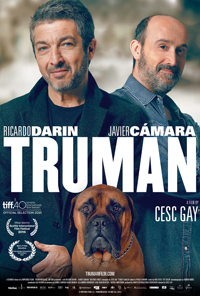The Dog Stops Here: Gay’s Subtle Drama Grapples with Saying Goodbye
 Although it offers nothing thematically new on the clichéd scenario of the disease film, wherein cancer claims the lives of a beloved while those around them careen through stages of anguish, Spanish filmmaker Cesc Gay at least manages some semblance of sincerity with his seventh feature, Truman. Starring the combined star wattage of Spain’s Javier Camara and Argentina’s Ricardo Darin should be reason alone for art-house auds to seek this tenderhearted drama about a beloved actor who must reconcile several brooding issues, such as finding a home for his titular named dog, before he bids adieu on his own terms. Although Gay doesn’t hit on anything revolutionary, he lands some particularly touching moments, which should surprise many a cynical mindset who believes they’ll be able to predict every beat of this familiar cinematic situation a mile off.
Although it offers nothing thematically new on the clichéd scenario of the disease film, wherein cancer claims the lives of a beloved while those around them careen through stages of anguish, Spanish filmmaker Cesc Gay at least manages some semblance of sincerity with his seventh feature, Truman. Starring the combined star wattage of Spain’s Javier Camara and Argentina’s Ricardo Darin should be reason alone for art-house auds to seek this tenderhearted drama about a beloved actor who must reconcile several brooding issues, such as finding a home for his titular named dog, before he bids adieu on his own terms. Although Gay doesn’t hit on anything revolutionary, he lands some particularly touching moments, which should surprise many a cynical mindset who believes they’ll be able to predict every beat of this familiar cinematic situation a mile off.
Julian (Darin), a noted actor working in Madrid, is surprised to see his childhood friend Tomas (Camara) make an unsolicited visit all the way from Canada. Tomas has been alerted of his old friend’s condition, and learns Julian is not only suffering from cancer but has decided to forego treatment options. Rather than spend his four days in Madrid bemoaning his friend’s decision, Tomas assists Julian in the most emotionally wrenching task at hand—finding a comfortable new home for his longtime companion, his faithful dog Truman.
Truman begins as a reunion film and then quickly becomes an exercise in the act of saying goodbye. Perhaps still best known for his 2000 coming-of-age drama Nico and Dani, Gay reunites with Camara for the third time and Darin for the second (both actors were in his previous feature, the 2012 comedy A Gun in Each Hand) for the kind of dialed down two-hander which seems to suit his style. Both actors have an obvious, amiable rapport, and Gay takes his time navigating their re-introduction, with Julian’s trusty dog representing the catalyst (rather than Julian’s professional accomplishments or faded relationships) for the film’s more tender, heartfelt moments. Trying to decide what family or person to leave Truman with proves to be Julian’s last great errand, and when a meeting with a lesbian couple who want to adopt a grown dog as a companion for their adopted son ends with Truman staying for a surprise overnight visit, the resulting resistance and gush of emotion is landed with crushing sincerity on the part of Darin. Likewise, an unplanned moment in a restaurant with a man he once cuckolded retains this same sense of yearning to leave the world a better place than he otherwise lived in it. These moments tend to work a bit better than some of Julian’s more aristocratic bits of dialogue. “Each man dies as best he can,” he sums up for us, although these lofty notations often take us out of the film’s more subtle elements.
Camara has the more difficult character to unveil, though some subtle sympathy builds in his scenes with supporting characters, such as Dolores Fonzi (the lead from Santiago Mitre’s Paulina, 2015) as Julian’s cousin. “He’s the first of my friends who is dying,” he admits to her. This dips into an unlikely romance, which more or less allows these characters to shed some anguish in the distraction of pleasure but nonetheless feels a bit unnecessary. Poignant without overstepping its bounds, Truman is an enjoyable, if sometimes insubstantial member of the popular disease film subgenre.
★★★/☆☆☆☆☆


